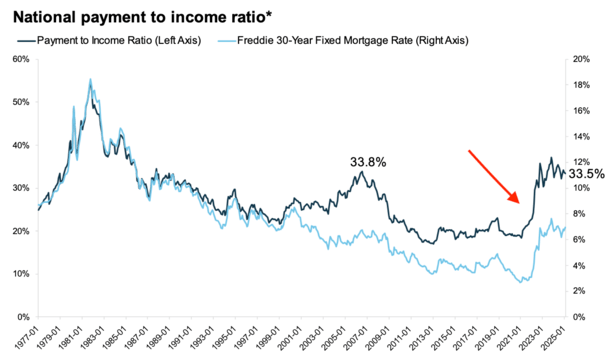You may have heard that Warren Buffett’s Berkshire Hathaway bought shares in a pair of home builders last quarter.
The company released its latest 13-F yesterday, revealing the buys during the second quarter.
This has led to a lot of speculation about why they’d be buying stock in home builders, which have struggled of late due to a lack of affordability.
Is something expected to change sometime soon? And if so, what exactly would make these companies all of a sudden attractive?
Perhaps the thought of lower mortgage rates is behind the
What Does Berkshire See in the Home Builders?
During the second quarter, Berkshire Hathaway purchased a whopping 5.3 million shares of Lennar (NYSE:LEN).
A quarter earlier, the company loaded up on 1.8 million shares to add to the 200,000 shares it bought back in 2023, bringing their total above seven million shares.
It was also revealed that Berkshire acquired 1.5 million shares of D.R. Horton (NYSE:DHI) in the first quarter before selling 27,000 of those shares a quarter later.
Berkshire had previously owned DHI stock, acquiring six million shares in Q2 2023 and unloading them by the fourth quarter of that year.
Now they appear to be back on the builders, but why? Why at a time when the housing market seems shaky, and affordability remains poor?
Oh, and new home inventory keeps ticking higher and is now approaching 10 months of supply.
Outside of the spike in the second half of 2022, when mortgage rates surged from sub-3% levels to 7%, newly-built inventory hasn’t been higher since the Great Financial Crisis (GFC).
It’s possible they just saw a bargain, with Lennar shares trading as high as $178 last September before falling to nearly $100 in April.
Similarly, D.R. Horton shares nearly touched $200 late last year and then tumbled to around $125 per share in the first quarter.
So it’s perfectly feasible that they just saw a big drop in share price and felt it was a value play, perhaps around Liberation Day.
But you still need to have a belief that they’ll perform well in the near future.
And in order to that, they’ll need to keep selling homes for a profit, despite poor buying conditions today.
How Lower Mortgage Rates Could Reignite the Housing Market and Help the Big Builders

D.R. Horton and Lennar are the two largest home builders in the country, which has its advantages.
One of them is being able to offer mortgages via their own in-house lending units, DHI Mortgage and Lennar Mortgage.
When you look at housing affordability, it eroded quickly due to the unprecedented shift in mortgage rates, as seen in the chart above from ICE.
This is mainly why home builders now offer massive mortgage rate buydowns, to keep affordability in range, even without lowering prices.
However, that also costs them a lot of money, and if they can get more buyers in the door without that cost, their margins would improve once again.
Lower mortgage rates could turn things around in a hurry. For example, a 1% decline in mortgage rate is akin to an 11% price drop.
So if mortgage rates were able to come down some, the builders would have an easier time unloading inventory.
A lot of people seem convinced all of a sudden that mortgage rates are coming down, largely because they think the Fed is going to become more accommodative once Chair Jerome Powell exits in May.
While that’s not necessarily how it works (the Fed doesn’t set mortgage rates), they can lower the fed funds rate.
That would lead to lower rates on HELOCs without question (since prime and the FFR move in lockstep), and could arguably lead to lower rates on adjustable-rate mortgages (ARMs) as well.
At the same time, a cooling economy could bring long-term mortgage rates like the 30-year fixed down too if the data continues to support that narrative.
The latest jobs report was what pushed mortgage rates back toward the lower-6% range, and if it continues into coming months, rates will likely drift even lower.
Of course, you’ve got the trade-off of a weaker economy, which means home buyer demand could take a hit too.
But lower rates could certainly provide a tailwind for the home builders and allow them to clear their inventory much easier.
Perhaps Berkshire is banking on another leg up for the housing market on this theory. Or, as alluded to earlier, they just saw a value play, and could be holding for only a short period. Time will well.
Read on: Home Builders Are Advertising Monthly Payments Instead of Home Prices to Clear Inventory

